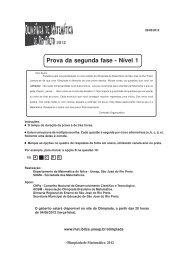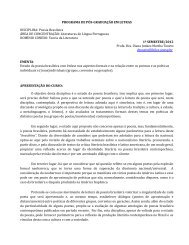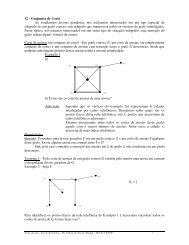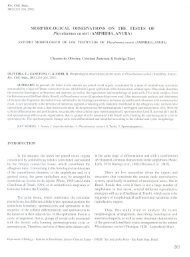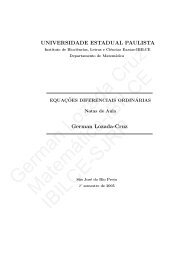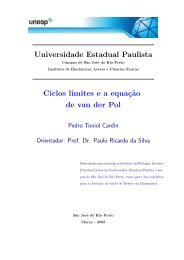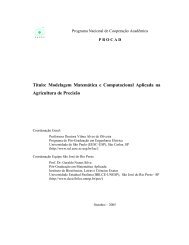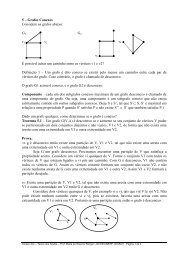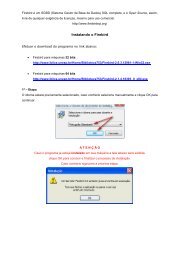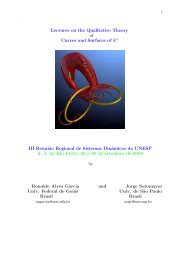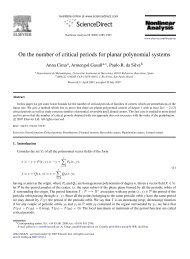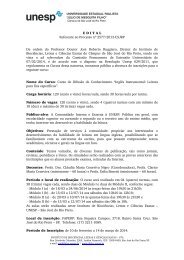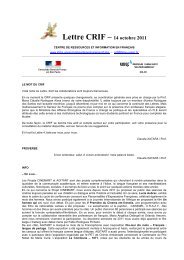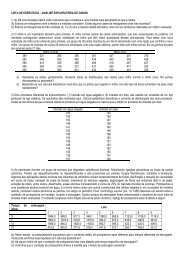- Page 1 and 2:
II Congresso Internacional da ABRAP
- Page 3 and 4: II Congresso Internacional da ABRAP
- Page 5 and 6: 13:30 - Colóquios de Pesquisa14:30
- Page 7 and 8: II Congresso Internacional da ABRAP
- Page 9 and 10: II Congresso Internacional da ABRAP
- Page 11 and 12: II Congresso Internacional da ABRAP
- Page 13 and 14: II Congresso Internacional da ABRAP
- Page 15 and 16: II Congresso Internacional da ABRAP
- Page 17 and 18: II Congresso Internacional da ABRAP
- Page 19 and 20: II Congresso Internacional da ABRAP
- Page 21 and 22: II Congresso Internacional da ABRAP
- Page 23 and 24: SALÃO CEDRO - Comunicações Indiv
- Page 25 and 26: II Congresso Internacional da ABRAP
- Page 27 and 28: Quarta-feira, 03 de junho 20099h30I
- Page 29 and 30: II Congresso Internacional da ABRAP
- Page 31 and 32: II Congresso Internacional da ABRAP
- Page 33 and 34: II Congresso Internacional da ABRAP
- Page 35 and 36: II Congresso Internacional da ABRAP
- Page 37 and 38: II Congresso Internacional da ABRAP
- Page 39: II Congresso Internacional da ABRAP
- Page 43 and 44: II Congresso Internacional da ABRAP
- Page 45 and 46: II Congresso Internacional da ABRAP
- Page 47: II Congresso Internacional da ABRAP
- Page 50 and 51: Programação & Caderno de ResumosT
- Page 52 and 53: Programação & Caderno de Resumost
- Page 56 and 57: Programação & Caderno de Resumos
- Page 58 and 59: Programação & Caderno de ResumosN
- Page 60 and 61: Programação & Caderno de Resumosa
- Page 62 and 63: Programação & Caderno de Resumos*
- Page 64 and 65: Programação & Caderno de ResumosB
- Page 67 and 68: II Congresso Internacional da ABRAP
- Page 69 and 70: II Congresso Internacional da ABRAP
- Page 71 and 72: II Congresso Internacional da ABRAP
- Page 73 and 74: II Congresso Internacional da ABRAP
- Page 75 and 76: II Congresso Internacional da ABRAP
- Page 77 and 78: II Congresso Internacional da ABRAP
- Page 79 and 80: II Congresso Internacional da ABRAP
- Page 81 and 82: II Congresso Internacional da ABRAP
- Page 83 and 84: II Congresso Internacional da ABRAP
- Page 85 and 86: II Congresso Internacional da ABRAP
- Page 87 and 88: II Congresso Internacional da ABRAP
- Page 89 and 90: II Congresso Internacional da ABRAP
- Page 91 and 92: II Congresso Internacional da ABRAP
- Page 93 and 94: II Congresso Internacional da ABRAP
- Page 95 and 96: II Congresso Internacional da ABRAP
- Page 97 and 98: II Congresso Internacional da ABRAP
- Page 99 and 100: II Congresso Internacional da ABRAP
- Page 101 and 102: II Congresso Internacional da ABRAP
- Page 103 and 104: II Congresso Internacional da ABRAP
- Page 105 and 106:
II Congresso Internacional da ABRAP
- Page 107 and 108:
II Congresso Internacional da ABRAP
- Page 109 and 110:
II Congresso Internacional da ABRAP
- Page 111 and 112:
II Congresso Internacional da ABRAP
- Page 113 and 114:
II Congresso Internacional da ABRAP
- Page 115 and 116:
II Congresso Internacional da ABRAP
- Page 117 and 118:
II Congresso Internacional da ABRAP
- Page 119 and 120:
II Congresso Internacional da ABRAP
- Page 121 and 122:
II Congresso Internacional da ABRAP
- Page 123 and 124:
II Congresso Internacional da ABRAP
- Page 125 and 126:
II Congresso Internacional da ABRAP
- Page 127 and 128:
II Congresso Internacional da ABRAP
- Page 129 and 130:
II Congresso Internacional da ABRAP
- Page 131 and 132:
II Congresso Internacional da ABRAP
- Page 133 and 134:
II Congresso Internacional da ABRAP
- Page 135 and 136:
II Congresso Internacional da ABRAP
- Page 137 and 138:
II Congresso Internacional da ABRAP
- Page 139 and 140:
II Congresso Internacional da ABRAP
- Page 141 and 142:
II Congresso Internacional da ABRAP
- Page 143 and 144:
II Congresso Internacional da ABRAP
- Page 145 and 146:
II Congresso Internacional da ABRAP
- Page 147 and 148:
II Congresso Internacional da ABRAP
- Page 149 and 150:
II Congresso Internacional da ABRAP
- Page 151 and 152:
II Congresso Internacional da ABRAP
- Page 153 and 154:
II Congresso Internacional da ABRAP
- Page 155 and 156:
II Congresso Internacional da ABRAP
- Page 157 and 158:
II Congresso Internacional da ABRAP
- Page 159 and 160:
II Congresso Internacional da ABRAP
- Page 161 and 162:
II Congresso Internacional da ABRAP
- Page 163 and 164:
II Congresso Internacional da ABRAP
- Page 165 and 166:
II Congresso Internacional da ABRAP
- Page 167 and 168:
II Congresso Internacional da ABRAP
- Page 169 and 170:
II Congresso Internacional da ABRAP
- Page 171 and 172:
II Congresso Internacional da ABRAP
- Page 173 and 174:
II Congresso Internacional da ABRAP
- Page 175 and 176:
II Congresso Internacional da ABRAP
- Page 177 and 178:
II Congresso Internacional da ABRAP
- Page 179 and 180:
II Congresso Internacional da ABRAP
- Page 181 and 182:
II Congresso Internacional da ABRAP
- Page 183 and 184:
II Congresso Internacional da ABRAP
- Page 185 and 186:
II Congresso Internacional da ABRAP
- Page 187 and 188:
II Congresso Internacional da ABRAP
- Page 189 and 190:
II Congresso Internacional da ABRAP
- Page 191 and 192:
II Congresso Internacional da ABRAP
- Page 193 and 194:
II Congresso Internacional da ABRAP
- Page 195 and 196:
II Congresso Internacional da ABRAP
- Page 197 and 198:
II Congresso Internacional da ABRAP
- Page 199 and 200:
II Congresso Internacional da ABRAP
- Page 201 and 202:
II Congresso Internacional da ABRAP
- Page 203 and 204:
II Congresso Internacional da ABRAP
- Page 205 and 206:
II Congresso Internacional da ABRAP
- Page 207 and 208:
II Congresso Internacional da ABRAP
- Page 209 and 210:
II Congresso Internacional da ABRAP
- Page 211 and 212:
II Congresso Internacional da ABRAP
- Page 213 and 214:
II Congresso Internacional da ABRAP
- Page 215 and 216:
II Congresso Internacional da ABRAP
- Page 217 and 218:
II Congresso Internacional da ABRAP
- Page 219 and 220:
II Congresso Internacional da ABRAP
- Page 221 and 222:
II Congresso Internacional da ABRAP
- Page 223 and 224:
II Congresso Internacional da ABRAP
- Page 225 and 226:
II Congresso Internacional da ABRAP
- Page 227 and 228:
II Congresso Internacional da ABRAP
- Page 229 and 230:
II Congresso Internacional da ABRAP
- Page 231 and 232:
II Congresso Internacional da ABRAP
- Page 233 and 234:
II Congresso Internacional da ABRAP
- Page 235 and 236:
II Congresso Internacional da ABRAP
- Page 237 and 238:
II Congresso Internacional da ABRAP
- Page 239 and 240:
II Congresso Internacional da ABRAP
- Page 246 and 247:
Programação & Caderno de Resumosd
- Page 250 and 251:
Programação & Caderno de Resumosd
- Page 252 and 253:
Programação & Caderno de Resumosu
- Page 254 and 255:
Programação & Caderno de Resumosa
- Page 256 and 257:
Programação & Caderno de ResumosD
- Page 258 and 259:
Programação & Caderno de Resumose
- Page 260 and 261:
Programação & Caderno de Resumosq
- Page 262 and 263:
Programação & Caderno de Resumosc
- Page 264 and 265:
Programação & Caderno de Resumosb
- Page 266 and 267:
Programação & Caderno de Resumoss
- Page 268 and 269:
Programação & Caderno de ResumosI
- Page 270 and 271:
Programação & Caderno de ResumosO
- Page 272 and 273:
Programação & Caderno de Resumost
- Page 274 and 275:
Programação & Caderno de Resumosd
- Page 276 and 277:
Programação & Caderno de Resumosa
- Page 278 and 279:
Programação & Caderno de ResumosL
- Page 280 and 281:
Programação & Caderno de Resumost
- Page 282 and 283:
Programação & Caderno de Resumosp
- Page 284 and 285:
Programação & Caderno de ResumosP
- Page 286 and 287:
Programação & Caderno de Resumosd
- Page 288 and 289:
Programação & Caderno de Resumosd
- Page 290 and 291:
Programação & Caderno de Resumosp
- Page 292 and 293:
Programação & Caderno de Resumoss
- Page 294 and 295:
Programação & Caderno de Resumost
- Page 296 and 297:
Programação & Caderno de ResumosI
- Page 298 and 299:
Programação & Caderno de Resumosb
- Page 300 and 301:
Programação & Caderno de Resumosa
- Page 302 and 303:
Programação & Caderno de ResumosH
- Page 304 and 305:
Programação & Caderno de Resumosa
- Page 306 and 307:
Programação & Caderno de Resumosd
- Page 308 and 309:
Programação & Caderno de Resumosb
- Page 310 and 311:
Programação & Caderno de ResumosA
- Page 312 and 313:
Programação & Caderno de ResumosR
- Page 314 and 315:
Programação & Caderno de Resumosp
- Page 316 and 317:
Programação & Caderno de Resumosd
- Page 318 and 319:
Programação & Caderno de Resumosl
- Page 320 and 321:
Programação & Caderno de Resumosp



